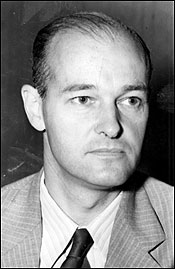
George Kennan (1904-2005) was an American diplomat who served in Europe and the Soviet Union during and after World War II. Kennan’s advice to Washington shaped United States foreign policy in the early Cold War.
Kennan was born in Milwaukee, the son of a tax lawyer. His mother died shortly after Kennan was born and he was raised by his father and German-speaking stepmother. Kennan developed a love of languages and came to speak English, German, Russian, French and others – a talent that served him well in his career.
George Kennan was opposed to forming a wartime alliance with the Soviets, arguing that the Allies should not enter into deals or agreements with Joseph Stalin. As early as 1942 Kennan predicted that post-war Europe would be divided into Western and Soviet spheres of influence. After the war, Kennan’s advice began to carry more weight with the US government.
In February 1946, Kennan drafted a lengthy communique – later dubbed the ‘Long Telegram‘ – that summarised his views on the Soviet Union and its agenda. This document, which spoke ominously about Soviet intentions and urged a policy of containment, contributed to the Truman Doctrine and American foreign policy in the early years of the Cold War. His article “The Sources of Soviet Conduct“, published anonymously in July 1947, argued that Stalin was using containment to reinforce his own power inside Russia.
Kennan was appointed American ambassador to the Soviet Union in 1951. The Soviets, by now aware of his recommendations, made Kennan’s position untenable. He was expelled from Moscow four months later, after complaining about the living conditions in the American embassy. He returned to the US and worked with the Eisenhower administration, before serving for a time as the ambassador to Yugoslavia. Kennan later entered academia and became a prominent historian, specialising in 20th century Russia and the Cold War. He lived to the age of 101 and was active and outspoken on foreign policy right up to his death in March 2005.
Content on this page is © Alpha History 2018-23. This content may not be republished or distributed without permission. For more information please refer to our Terms of Use.
This page was written by Jennifer Llewellyn and Steve Thompson. To reference this page, use the following citation:
J. Llewellyn & S. Thompson, “George Kennan”, Alpha History, accessed [today’s date], https://alphahistory.com/coldwar/george-kennan/.
